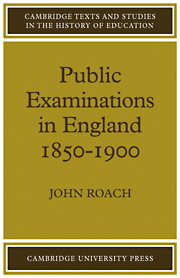Book contents
- Frontmatter
- Contents
- Dedication
- Preface
- List of abbreviations
- PART I THE COMPETITIVE PRINCIPLE ESTABLISHED
- 1 Patronage and competition
- 2 Middle-class education
- 3 Examinations and schools – to 1857
- PART II THE OXFORD AND CAMBRIDGE LOCALS AND NATIONAL EDUCATION, 1857–1900
- PART III THE PUBLIC CONTEXT, 1855–1900
- Bibliography
- Index
2 - Middle-class education
Published online by Cambridge University Press: 07 October 2011
- Frontmatter
- Contents
- Dedication
- Preface
- List of abbreviations
- PART I THE COMPETITIVE PRINCIPLE ESTABLISHED
- 1 Patronage and competition
- 2 Middle-class education
- 3 Examinations and schools – to 1857
- PART II THE OXFORD AND CAMBRIDGE LOCALS AND NATIONAL EDUCATION, 1857–1900
- PART III THE PUBLIC CONTEXT, 1855–1900
- Bibliography
- Index
Summary
Though the universities were the birthplace of the changes which have just been outlined, the effect of them was bound to be felt through all the educational institutions of the country. Indeed the reformers were anxious that this should happen, for they were very conscious, as we have seen, of the interrelationships between education at all levels. Yet these terms must not be misunderstood. The reformers believed that one part of the whole would not flourish unless the other parts were in a healthy state, yet neither they nor other Victorians understood this interrelationship to mean genuine interdependence. The parts of the educational structure cohered together but they did not depend on one another in the sense in which the mid-twentieth century sees education as a single national concern which oversteps local or class boundaries. To the Victorians each of the great class groupings – upper, middle and lower – required its own separate institutions because each class had its own separate needs. This statement needs explaining by a fuller examination, which will follow later, of Victorian ideas about the class structure but for the moment a simile may help to make the point. Schools created for the needs of different classes were like a grove of trees which owes much of its beauty to the fact that all the trees are seen as a whole.
- Type
- Chapter
- Information
- Public Examinations in England 1850–1900 , pp. 35 - 55Publisher: Cambridge University PressPrint publication year: 1971



